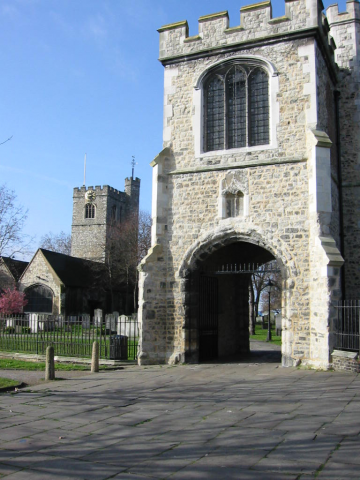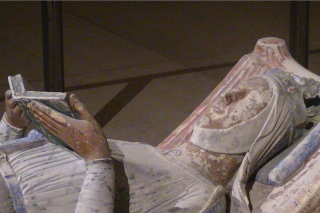For Diana Myers ’24MS, a longstanding fascination with the Middle Ages began in elementary school. “One day I was at home sick, and my mom showed me the film The Lion in Winter [1968],” says Myers. The film stars Katharine Hepburn as Eleanor of Aquitaine (1122–1204), a patron of the troubadours who became Queen of France and subsequently Queen of England. “This movie captivated my imagination and I dressed up as Eleanor for the next Halloween. I have been interested in twelfth-century Europe ever since.”
First Encounter with Archives
As an undergraduate major in History & Literature at Harvard University and during her first master’s degree in Medieval Studies at the University of Oxford, Myers developed a particular interest in medieval religious women in England. Her undergraduate thesis focused on St. Anne, presumed to have been the Virgin Mary’s mother. “I was looking at traditions of venerating Anne and their evolution over the centuries,” she recalls. “The popularization of Anne informed discourses of medieval motherhood and she provided a template of what a good Christian mother should do.”
During her first semester as an undergraduate student, Myers took a course on the history of the book, which exposed her to premodern manuscripts and rare books. “My first exposure to medieval manuscripts was amazing, and I realized that I wanted to do this every day,” she recollects.
Myers became acquainted with several librarians and archivists at Harvard, and soon landed a student position in the Harvard library system. She worked within the Theatre Collection, archiving early modern engravings and old photographs of stage productions. After starting graduate school at Simmons, Myers worked in Harvard’s Business School archives, where she organized institutional records, old student papers, and former professors’ files. “Making ‘fancy lists’ of these materials included in our library catalog helps users to have a better sense of what our collections contain,” says Myers.
How Primary Sources Animated Myers’ Work

Myers’ graduate studies at Oxford culminated in a master’s thesis about the nuns of Barking Abbey, a monastic house for women located within the greater London area. “The Barking nuns left behind a stunning archival record. When examining their manuscripts, I became interested in how women’s authority was codified in that community, especially with the figure of the abbess [i.e., the head nun].”
During her research, Myers consulted a fascinating manuscript from Barking Abbey that sheds light on the priestly duties of the abbess. Part of the manuscript contains a script for a sacred play performed at Easter. It reenacts the death, burial, and resurrection of Christ. “It was an honor for a nun at Barking to play Mary Magdalene approaching the tomb. At some point, the nuns/actors would enter a side chapel to change their clothes. Then they turned to the abbess and said: ‘Confiteor,’ or ‘I confess.’”
For a medievalist and archivist with a penchant for gender and sexuality studies, this passage intrigues Myers. In medieval Christianity (as for Catholicism today), only ordained men could hear confessions from the faithful. “Is this moment representing an actual confession that you would tell a priest, or is it something else, such as a shorthand for a different prayer?” asks Myers. “Regardless, it suggests that the abbess played a more significant role in defining medieval ritual than is generally recognized.” Myers’ research, therefore, shows how accessing original documents illuminates our understanding of the past.
A Medievalist Embraces Alternative Career Paths
As an undergraduate, Myers also held an internship at Dumbarton Oaks, Harvard’s humanities research center in Washington, D.C., that involved copyediting translations of medieval texts. While she still maintains a freelance editing business on the side, her passion is to become an archivist and increase in-person access to rare books and manuscripts.
“There are several historical and preservation-related reasons why some archives are hard for users to access. But if you really want to understand how a book was made, the digital surrogate does not suffice,” says Myers. “You have to be able to physically handle the book and turn it over. You need to see and feel for yourself what the binding feels like under your hands.” Myers believes it’s important to let people hold these objects, with the proper protocols in place.
When she was completing her Medieval Studies degree at Oxford, Myers decided to enter a professional degree program in library and information science. Since she had attended college in the Boston area, she was well aware of Simmons’ School of Library and Information Science (SLIS). “When I was abroad, I mentioned Simmons to a librarian in the UK, and he said he knew of it, and that it was a good program. At that point, I realized that Simmons is known internationally among librarians. I feel that if I apply for a job anywhere in the world, they will recognize the value of a Simmons LIS degree. As a bonus, all of my college friends are still in Boston, so coming to Simmons was a win-win,” she says.
Dr. Lisa Fagin Davis, an Adjunct Lecturer at SLIS, has been an important mentor for Myers. She took Davis’s course, “The Medieval Manuscript from Charlemagne to Gutenberg” (LIS 464), in Fall 2022. This course explores medieval manuscripts in American collections, book history, and paleography (i.e., old handwriting and calligraphy). After completing her first year at Simmons, Myers landed a job as Special Projects Assistant with the Medieval Academy of America (MAA), of which Davis serves as Executive Director.
“We are coming up on the centennial of the MAA, which was founded in 1925,” explains Myers. “To commemorate this milestone, the staff wants to digitize many historical documents, including meeting minutes, photographs of the annual meetings, and bios of the Fellows, who are scholars who’ve made a big impact in the field. I have been hired to assist them in scanning and archiving these materials. Putting this archive together is a great way to understand the growth of medieval studies in North America.”
At Simmons, Myers is also researching more modern topics. During her last semester, she is conducting an independent study with Associate Professor Peter Botticelli. “I am working on issues of access and use related to women’s healthcare and archival abortion records,” says Myers. “I have been thinking about modern usage and access, too. And doing this research at a women-centered institution gives my project more resonance.”
Simmons has enabled Myers to refine her stance on archival ethics. “In one of my Fall 2023 classes, ‘Establishing Archives and Manuscript Programs’ taught by former University Archivist Jason Wood ’01MS, ’11MS, we were discussing use and access as part of the librarian’s code of honor. For me, this is the most important issue regarding medieval archives. There is no point in holding onto things if no one can come and enjoy them,” she says.
With graduation looming, Myers just landed a job as a cataloger for a rare books dealer in Philadelphia, her home city. “I’m interested in this corner of the rare books and archives world as a chance to learn more about how institutions and private individuals can acquire and care for unique materials in a range of settings.”
Eventually, Myers aspires to obtain a doctorate in medieval history, after which she will return to library work. “As an archivist, I want to make the Middle Ages exciting to people through tactile experiences, that is, by letting them touch the original manuscripts. It’s so satisfying to me to watch people discover old artifacts and bring new life to them.”

